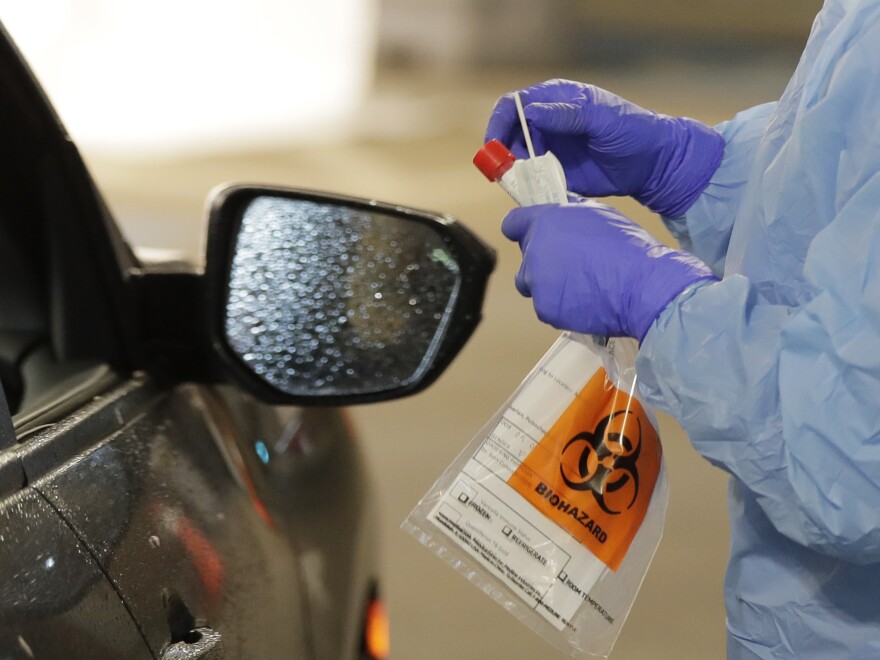As the more contagious delta variant of the coronavirus spreads in the Lubbock community, local health leaders say diagnosing new cases early is key to reducing the risk of spread.
There are currently over 4,800 active COVID-19 cases in the community and less than half of eligible Lubbockites are fully vaccinated.
Whether you’re vaccinated or not, here’s what you need to know about getting tested for COVID-19 in Lubbock.
What symptoms are we looking out for these days?
The most common symptoms of the delta variant are sore throat, runny nose, headache and fever, according to the latest guidance from the Centers for Disease Control and Prevention.
Other signs include fatigue, soreness and gastrointestinal problems.
My symptoms could be caused by allergies or a cold. Should I get tested?
Even if your symptoms aren’t out of the ordinary for you, if you’ve been in areas or situations where a COVID-19 exposure could have happened, it’s best to get tested.
Lubbock’s Health Authority Dr. Ron Cook said at a recent news conference that it’s also a good practice to wear a mask around others should you have any concerning symptoms.
I’m not vaccinated and have symptoms. Should I get tested?
Lubbock health leaders say the delta variant of the coronavirus is the most prevalent in Lubbock right now. According to the CDC, delta is about twice as infectious as the original strain.
Some data shows that people who are not vaccinated may have a more severe case of the illness. Both locally and nationally, the majority of people hospitalized for complications of COVID-19 are not vaccinated.
Early detection is key to treating this disease. So, yes, you should get tested.
I’m vaccinated but have some symptoms. Should I get tested?
As more data about vaccinated people and the delta variant becomes available, it shows immunization is protecting most people from catching COVID-19. A recent analysis from the New York Times estimates vaccinated people have a 1 in 5,000 chance of what’s been called a “breakthrough” infection.
Still, it’s not impossible. While you have symptoms, it’s advised you at least distance yourself from others and wear a mask. If you’ve been directly exposed to COVID-19, you should get tested.
My child was exposed or has symptoms. How do I get them tested?
It’s a good idea to first consult your pediatrician. If testing is recommended, the process is the same as it is for adults.
Statistically, children are less likely to contract COVID-19. But, it happens and can result in severe disease. Like with adults, early detection is important for little ones.
I was exposed to COVID-19 but do NOT have symptoms. Should I get tested?
If it was a close contact exposure, you should get tested. The CDC defines close contact as being “within 6 feet of an infected person for a total of 15 minutes or more over a 24-hour period.”
When should I get tested?
It’s recommended to wait three to five days after a potential exposure before you get tested. That’ll give you the most accurate result.
What are the criteria to get tested?
Most testing providers are going to ask you to complete a short survey before booking an appointment. Those survey questions will vary and may affect your eligibility for testing.
The City of Lubbock Health Department’s testing site at the Clapp Park Pool is now only testing those who have symptoms or have been directly exposed to someone with COVID-19. If you were exposed, you have to wait five days before testing at this center.
What are my testing options and how are they different?
COVID-19 testing has come a long way since the beginning of the pandemic.
A viral test will tell you if you have a current infection. PCR tests are one of the more common options. For that one, you shove a long cotton swab up your nose until your eyes water.
There are now also at-home rapid testing options available for purchase at most pharmacies. Though, local availability of those has been limited as the coronavirus spreads in the community.
How long does it take to get results?
This can vary by testing provider and type of test. Most providers ensure results within 72 hours. Often, the wait time is shorter.
Where can I get tested?
Clinics and pharmacies throughout the city offer testing. Most also now require an appointment, so call ahead or check in online.
The City of Lubbock has a list of testing centers on its website.
How much does it cost?
Cost will vary by testing provider. Some health insurance companies will cover the cost. But, free testing is available by appointment at CVS pharmacies, Highland Pharmacy and Parkway Pharmacy, according to the City of Lubbock Health Department’s website.
If you found the reporting above valuable, please consider making a donation to support local nonprofit journalism. Thanks for donating today.
Have a news tip? Email Sarah Self-Walbrick at saselfwa@ttu.edu. Follow her reporting on Twitter @SarahFromTTUPM.



